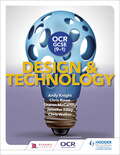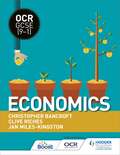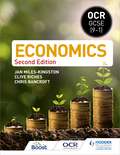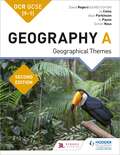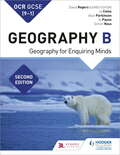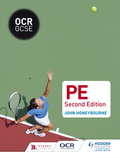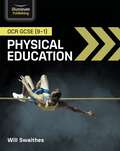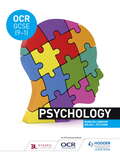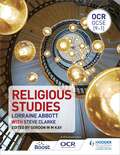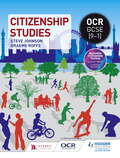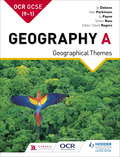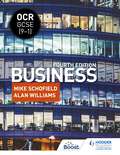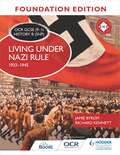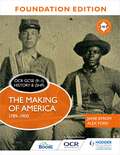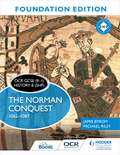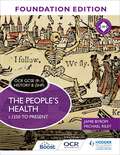- Table View
- List View
OCR GCSE (9-1) Design and Technology
by Chris Rowe Andy Knight Sharon MccarthyExplore, create, evaluate: help your students to develop an understanding of the iterative design process and to be critical and innovative designers, while developing the knowledge and skills they need for the 2017 OCR GCSE D&T specification. Confidently navigate both the core and in-depth principles of design and technology, including less familiar materials and system components, to ensure your students have the knowledge and understanding they need.· Builds a toolkit of knowledge, understanding and design development skills for the chosen materials or systems, with dedicated chapters covering each of the main categories of materials· Develops mathematical and scientific skills with practice questions that apply this learning in context· Supports the Non-Exam Assessment with guidance on how to approach the Iterative Design Challenge, which includes imaginative and creative examples of student projects to inspire and engage· Helps students to prepare for the written assessment with practice questions covering both the 'core' and 'in-depth' content
OCR GCSE (9-1) Economics
by Christopher Bancroft Clive Riches Jan Miles-KingstonExam Board: OCRLevel: GCSESubject: EconomicsFirst Teaching: September 2017First Exam: June 2019Build students' knowledge of economics and understanding of its impact beyond the classroom with this new textbook, produced by the leading Economics publisher and OCR's publishing partner.- Develop knowledge with clear explanations in every chapter, end-of-chapter summaries and key terms highlighted for on-going revision- Understand economics in context with up-to-date examples of economic challenges on a local, national and global level- Extend your learning and develop critical skills with engaging stretch and challenge tasks- Prepare for exams with plenty of practice questions and activities that improve your critical thinking skills
OCR GCSE (9-1) Economics: Second Edition
by Christopher Bancroft Clive Riches Jan Miles-KingstonThis fully updated student textbook for OCR GCSE Economics will help you develop an understanding of the principles of economics and its impact outside the classroom. This new edition is specially designed to make economics accessible and help you tackle complex topics with confidence.- Includes new, up-to-date case studies to demonstrate how economic concepts can be applied in the real world- Highlights key terms throughout to increase your confidence and improve your essay-writing skills, with cross-references between different topics in the specification- Develops your analysis and evaluation skills through classroom activities and full practice questions, plus a revised 'evaluate this' feature, demonstrating how questions are structured and helping you to recognise command words- Helps you apply your developing knowledge of economic theory and issues to a wider economic context
OCR GCSE (9-1) Geography A Second Edition
by David Rogers Simon Ross Alan Parkinson Jo Payne Jo ColesEquip your students for the OCR GCSE (9-1) Geography A specification with our fully revised second edition Student Book. Our expert author team bring you new and revised case studies and a wealth of practice questions to help your students apply their knowledge to succeed at GCSE.- Maps the content against the specification, providing an easy-to-follow teaching pathway designed by an author team of experienced teachers and examiners- Equips students with the subject knowledge and modern case study examples they need to maximise their potential, with opportunities to undertake developmental activities for each theme- Offers you a whole-class solution for teaching including activities suitable for all learners- Embeds a focus on mathematical and statistical skills throughout by including opportunities to analyse a range of maps, graphs, GIS material and data sources- Prepares students to approach assessment confidently with practice questions of varying difficulty and handy tips for writing successful answers- Highlights possible fieldwork projects and contains guidance on carrying out fieldwork, making it easier to integrate practical and theoretical learning
OCR GCSE (9-1) Geography A Second Edition
by David Rogers Simon Ross Alan Parkinson Jo Payne Jo ColesEquip your students for the OCR GCSE (9-1) Geography A specification with our fully revised second edition Student Book. Our expert author team bring you new and revised case studies and a wealth of practice questions to help your students apply their knowledge to succeed at GCSE.- Maps the content against the specification, providing an easy-to-follow teaching pathway designed by an author team of experienced teachers and examiners- Equips students with the subject knowledge and modern case study examples they need to maximise their potential, with opportunities to undertake developmental activities for each theme- Offers you a whole-class solution for teaching including activities suitable for all learners- Embeds a focus on mathematical and statistical skills throughout by including opportunities to analyse a range of maps, graphs, GIS material and data sources- Prepares students to approach assessment confidently with practice questions of varying difficulty and handy tips for writing successful answers- Highlights possible fieldwork projects and contains guidance on carrying out fieldwork, making it easier to integrate practical and theoretical learning
OCR GCSE (9-1) Geography B Second Edition
by David Rogers Simon Ross Alan Parkinson Jo Payne Jo ColesEquip your students for the OCR GCSE (9-1) Geography B specification with our fully revised second edition Student Book. Our expert author team bring you new and revised case studies and a wealth of practice questions to help your students apply their knowledge to succeed at GCSE.Build your students' subject knowledge and cross-disciplinary enquiry skills with this modern, topic-based approach, brought to life through clear explanations and skills-focused activities. Updated case studies provide students with new, contemporary and engaging content and new practice questions include increased opportunities for students to strengthen their exam skills.- Maps the content against the specification, providing an easy-to-follow teaching pathway designed by an author team of experienced teachers and examiners- Equips students with the subject knowledge and up-to-date case study examples they need to maximise their potential, with opportunities to undertake developmental activities for each topic- Offers you a whole-class teaching solution with activities that cater to all students- Embeds a focus on mathematical and statistical skills throughout by including opportunities to analyse a range of maps, graphs, GIS material and data sources- Prepares students to approach assessment confidently with practice questions of varying difficulty and handy tips for successfully answering enquiry questions- Highlights possible fieldwork projects and contains guidance on carrying out fieldwork, making it easier to integrate practical and theoretical learning
OCR GCSE (9-1) Geography B Second Edition
by David Rogers Simon Ross Alan Parkinson Jo Payne Jo ColesEquip your students for the OCR GCSE (9-1) Geography B specification with our fully revised second edition Student Book. Our expert author team bring you new and revised case studies and a wealth of practice questions to help your students apply their knowledge to succeed at GCSE.Build your students' subject knowledge and cross-disciplinary enquiry skills with this modern, topic-based approach, brought to life through clear explanations and skills-focused activities. Updated case studies provide students with new, contemporary and engaging content and new practice questions include increased opportunities for students to strengthen their exam skills.- Maps the content against the specification, providing an easy-to-follow teaching pathway designed by an author team of experienced teachers and examiners- Equips students with the subject knowledge and up-to-date case study examples they need to maximise their potential, with opportunities to undertake developmental activities for each topic- Offers you a whole-class teaching solution with activities that cater to all students- Embeds a focus on mathematical and statistical skills throughout by including opportunities to analyse a range of maps, graphs, GIS material and data sources- Prepares students to approach assessment confidently with practice questions of varying difficulty and handy tips for successfully answering enquiry questions- Highlights possible fieldwork projects and contains guidance on carrying out fieldwork, making it easier to integrate practical and theoretical learning
OCR GCSE (9-1) PE Second Edition
by John HoneybourneInspire, motivate and give confidence to your students with OCR PE for GCSE Second Edition. This reliable and accessible textbook is structured to match the specification exactly and will provide your students with the knowledge they need, while giving them the opportunity to build skills through appropriate activities.We are working in collaboration with OCR to produce this Student's Book.- Key questions to direct thinking and help students focus on the key points- Diagrams to aid understanding- Summaries to aid revision and help weaker students access the main points - Extension questions, stimulus material and suggestions for further reading to stretch, challenge and encourage independent thinking and a deeper understanding - Definition of key terms - again to aid and consolidate understanding of technical vocabulary and concepts- Activities to build conceptual understanding and sound knowledge and understanding, analysis, evaluation and application skills
OCR GCSE (9-1) Physical Education
by Will SwaithesWritten by an experienced PE teacher and author, this new resource is designed to be highly visual, accessible, and practical. // Presented in a 'Knowledge organiser' format to a give clear and concise overview of the key content // Provides a student-friendly checklist of the specification content being covered in each chapter // Tips and ideas to remember key information, 'application of knowledge' activities and 'extend your knowledge' tasks help prepare for assessment // Includes a chapter devoted to exam preparation with support for *6 mark extended answer 'synoptic' questions and data analysis advice // Provides a dedicated section on how to approach the NEA, including AEP advice // Includes the most recent 2019 data on participation, events and the world of sport, plus insight from teachers and examiners reports from the first two years of this new specification //
OCR GCSE (9-1) Psychology
by Mark Billingham Helen J. KitchingHelp students to build their subject knowledge and understanding with activities, guidance and assessment preparation tailored to the 2017 OCR requirements and brought to you by subject specialist and OCR's Publishing Partner for GCSE Psychology.- Prepare students for assessment with skills-building activities and practice questions developed for the new specification.- Progressively develop students' subject knowledge through accessible diagrams and key content summaries that aid understanding and help weaker students access the main points.- Build conceptual understanding and critical thinking skills with a wealth of targeted activities.- Extend learning and enhance responses with extension questions, stimulus material and suggestions for further reading. - Consolidate understanding of technical vocabulary and core concepts through accessible explanations of key terms.ContentsIntroduction1. Criminal Psychology2. Development3. Psychological problems4. Social influence5. Memory6. Sleep and Dreaming7. Research MethodsAnswers
OCR GCSE (9-1) Psychology
by Mark Billingham Helen KitchingHelp students to build their subject knowledge and understanding with activities, guidance and assessment preparation tailored to the 2017 OCR requirements and brought to you by subject specialist and OCR's Publishing Partner for GCSE Psychology. - Prepare students for assessment with skills-building activities and practice questions developed for the new specification.- Progressively develop students' subject knowledge through accessible diagrams and key content summaries that aid understanding and help weaker students access the main points.- Build conceptual understanding and critical thinking skills with a wealth of targeted activities.- Extend learning and enhance responses with extension questions, stimulus material and suggestions for further reading. - Consolidate understanding of technical vocabulary and core concepts through accessible explanations of key terms.ContentsIntroduction1. Criminal Psychology2. Development3. Psychological problems4. Social influence5. Memory6. Sleep and Dreaming7. Research MethodsAnswers
OCR GCSE (9-1) Religious Studies
by Steve Clarke Lorraine Abbott Gordon KayMotivate every student to deepen their understanding and fulfil their potential by following a stimulating, well-paced course through the strengthened content requirements; produced by the leading Religious Studies publisher and OCR's Publishing Partner.- Equips students with the detailed knowledge they need to succeed with clear, lively explanations that make key concepts accessible to all ability levels- Provides opportunities for students to learn, revise and develop their knowledge and skills through a variety of engaging activities, discussion points and extension tasks to stretch high achievers- Ensures that your lessons are both innovative and inclusive, supplying a bank of tasks that draw on best practice teaching methods such as SOLO taxonomy- Encourages students to take an active interest in every topic, using relevant news articles, real-life viewpoints and quotes from sacred texts to bring religious principles and practices to life- Boosts students' confidence approaching assessment via practice questions and guidance on tackling different question types- Enables you to teach the systematic study content confidently with comprehensive coverage of Christianity and Islam OCR GCSE RS Spec Content covered:Christianity- Beliefs and teachings- PracticesIslam- Beliefs and teachings- PracticesReligion, philosophy and ethics in the modern world from a Christian perspective- Relationships and families- The existence of God- Religion, peace and conflict- Dialogue between religious and non-religious beliefs and attitudes- Covers the short course content.
OCR GCSE (9-1) Religious Studies
by Steve Clarke Lorraine AbbottExam Board: OCRLevel: GCSESubject: RSFirst Teaching: September 2016First Exam: June 2018Motivate every student to deepen their understanding and fulfil their potential by following a stimulating, well-paced course through the strengthened content requirements; produced by subject specialists and OCR's Publishing Partner.- Equips students with the detailed knowledge they need to succeed with clear, lively explanations that make key concepts accessible to all ability levels.- Provides opportunities for students to learn, review and develop their knowledge and skills through a variety of engaging activities, discussion points and extension tasks to stretch high achievers.- Ensures that your lessons are both innovative and inclusive, supplying a bank of tasks that draw on best practice teaching methods.- Encourages students to take an active interest in every topic, using relevant news articles, real-life viewpoints and quotations from sacred texts to bring religious principles and practices to life.- Boosts students' confidence approaching assessment via practice questions and guidance on tackling different question types.- Enables you to teach the systematic study content confidently with comprehensive coverage of Christianity and Islam.OCR GCSE RS Spec Content covered:Christianity- Beliefs and teachings- PracticesIslam- Beliefs and teachings- PracticesReligion, philosophy and ethics in the modern world from a Christian perspective- Relationships and families- The existence of God- Religion, peace and conflict- Dialogue between religious and non-religious beliefs and attitudes- Covers the short course content.
OCR GCSE (91) Citizenship Studies
by Steve Johnson Graeme RoffeAn OCR endorsed textbook.Association for Citizenship Teaching Quality Mark resource. Encourage students of all abilities to develop an enthusiastic interest in contemporary UK society with knowledge-boosting activities and assessment support for the changed content and assessment criteria; produced by the leading Citizenship publisher and OCR's Publishing Partner.- Equip students with the knowledge and skills they need to fulfil their potential by working through a variety of developmental activities that are suitable for all ability levels- Provide opportunities for students to learn and practise the research, analytical, interpretative and evaluative skills required under the 2016 specification- Bring the key issues and concepts in Citizenship Studies to life using a bank of real-life case studies to enrich students' learning experience- Build students' confidence approaching assessment with targeted assessment preparation, guidance on crafting successful responses and practice questions that include plenty of source analysis tasks- Deliver high-quality lessons that meet the differing needs of your students, following an engaging teaching pathway created by a skilled teacher with extensive examining experience
OCR GCSE (91) Geography A: Geographical Themes
by Alan Parkinson Jo Payne Jo ColesExam Board: OCRLevel: GCSESubject: GeographyFirst Teaching: September 2016First Exam: June 2018An OCR endorsed textbookInstil a broad understanding of UK and global geographical issues using the clear explanations and skills-focused activities in this thematic study guide; tailored to the new assessment requirements and produced by one of the leading Geography publishers and OCR's Publishing Partner for Geography.- Maps the content against the reformed specification, providing an easy-to-follow teaching pathway designed by an author team of experienced teachers and examiners- Equips students with the subject knowledge and up-to-date case study examples they need to maximise their potential, with opportunities to undertake developmental activities for each theme- Offers you a whole-class solution to teaching the non-tiered papers with extension activities to stretch high achievers and scaffolded questions that support lower-ability students- Embeds a focus on mathematical and statistical skills throughout by including opportunities to analyse a range of maps, graphs, GIS material and data sources- Prepares students to approach assessment confidently with practice questions of varying difficulty and handy tips for writing successful answers- Highlights possible fieldwork projects and contains guidance on carrying out fieldwork, making it easier to integrate practical and theoretical learning
OCR GCSE (9–1) Business, Fourth Edition
by Alan Williams Mike SchofieldWith up-to-date case studies of real-world businesses, this fully updated OCR GCSE (9-1) Business Student Textbook will help your students respond to exam questions with confidence, demonstrating how they can structure their answers for maximum impact. This Student Textbook includes:- Fully up-to-date exam questions, with 25% more practice questions and increased practical support for tackling different question types- More exam tips and advice, with examiner commentary showing how students should approach exam questions- Real-world case studies, new and updated, to reflect the developments in e-commerce and the impact of recent global and political developments- Quick knowledge-recall questions throughout the book to help students check understanding, and for teachers to use in assessment
OCR GCSE (9–1) Business, Fourth Edition
by Alan Williams Mike SchofieldWith up-to-date case studies of real-world businesses, this fully updated OCR GCSE (9-1) Business Student Textbook will help your students respond to exam questions with confidence, demonstrating how they can structure their answers for maximum impact. This Student Textbook includes:- Fully up-to-date exam questions, with 25% more practice questions and increased practical support for tackling different question types- More exam tips and advice, with examiner commentary showing how students should approach exam questions- Real-world case studies, new and updated, to reflect the developments in e-commerce and the impact of recent global and political developments- Quick knowledge-recall questions throughout the book to help students check understanding, and for teachers to use in assessment
OCR GCSE (9–1) Citizenship Studies
by Steve Johnson Graeme RoffeAn OCR endorsed textbook.Association for Citizenship Teaching Quality Mark resource. Encourage students of all abilities to develop an enthusiastic interest in contemporary UK society with knowledge-boosting activities and assessment support for the changed content and assessment criteria; produced by the leading Citizenship publisher and OCR's Publishing Partner.- Equip students with the knowledge and skills they need to fulfil their potential by working through a variety of developmental activities that are suitable for all ability levels- Provide opportunities for students to learn and practise the research, analytical, interpretative and evaluative skills required under the 2016 specification- Bring the key issues and concepts in Citizenship Studies to life using a bank of real-life case studies to enrich students' learning experience- Build students' confidence approaching assessment with targeted assessment preparation, guidance on crafting successful responses and practice questions that include plenty of source analysis tasks- Deliver high-quality lessons that meet the differing needs of your students, following an engaging teaching pathway created by a skilled teacher with extensive examining experience
OCR GCSE (9–1) History B (SHP) Foundation Edition: Living under Nazi Rule 1933–1945
by Jamie Byrom Richard KennettExam board: OCR (Specification B, SHP)Level: GCSE (9-1)Subject: HistoryFirst teaching: September 2016First exams: Summer 2018An OCR endorsed textbook.Help more students access the content for OCR GCSE History B (SHP) with this Foundation Edition, designed to work alongside the mainstream textbook for effective co-teaching in the same class.Covering The Making of America 1789-1900, this book:- Follows the same structure and page numbers as the mainstream textbook so that students of all abilities can explore the same enquiries- Simplifies and reduces the text on each page, using carefully-controlled vocabulary and clear explanations of key terms- Focuses on the key points that students need to understand and includes new content summaries at the end of each enquiry to reinforce learning- Offers full support for the student tasks, using a wide range of scaffolding to make the tasks accessible and achievable- Provides specific assessment guidance and develops the historical thinking skills required for success at GCSEReading level measured and verified by MetaMetrics using the Lexile Framework for Reading
OCR GCSE (9–1) History B (SHP) Foundation Edition: Living under Nazi Rule 1933–1945
by Jamie Byrom Richard KennettExam board: OCR (Specification B, SHP)Level: GCSE (9-1)Subject: HistoryFirst teaching: September 2016First exams: Summer 2018An OCR endorsed textbook.Help more students to access the content for OCR GCSE History B (SHP) with this Foundation Edition, designed to work alongside the mainstream textbook for effective co-teaching in the same class.Covering The Making of America 1789-1900, this book:> Follows the same structure and page numbers as the mainstream textbook so that students of all abilities can explore the same enquiries> Simplifies and reduces the text on each page, using carefully-controlled vocabulary and clear explanations of key terms> Focuses on the key points that students need to understand and includes new content summaries at the end of each enquiry to reinforce learning> Offers full support for the student tasks, using a wide range of scaffolding to make the tasks accessible and achievable> Provides specific assessment guidance and develops the historical thinking skills required for success at GCSE
OCR GCSE (9–1) History B (SHP) Foundation Edition: The Making of America 1789–1900
by Jamie Byrom Alex FordExam board: OCR (Specification B, SHP)Level: GCSE (9-1)Subject: HistoryFirst teaching: September 2016First exams: Summer 2018An OCR endorsed textbook.Help more students access the content for OCR GCSE History B (SHP) with this Foundation Edition, designed to work alongside the mainstream textbook for effective co-teaching in the same class.Covering The Making of America 1789-1900, this book:- Follows the same structure and page numbers as the mainstream textbook so that students of all abilities can explore the same enquiries- Simplifies and reduces the text on each page, using carefully-controlled vocabulary and clear explanations of key terms- Focuses on the key points that students need to understand and includes new content summaries at the end of each enquiry to reinforce learning- Offers full support for the student tasks, using a wide range of scaffolding to make the tasks accessible and achievable- Provides specific assessment guidance and develops the historical thinking skills required for success at GCSEReading level measured and verified by MetaMetrics using the Lexile Framework for Reading
OCR GCSE (9–1) History B (SHP) Foundation Edition: The Making of America 1789–1900
by Jamie Byrom Alex FordExam board: OCR (Specification B, SHP)Level: GCSE (9-1)Subject: HistoryFirst teaching: September 2016First exams: Summer 2018An OCR endorsed textbook.Help more students to access the content for OCR GCSE History B (SHP) with this Foundation Edition, designed to work alongside the mainstream textbook for effective co-teaching in the same class.Covering The Making of America 1789-1900, this book:> Follows the same structure and page numbers as the mainstream textbook so that students of all abilities can explore the same enquiries> Simplifies and reduces the text on each page, using carefully-controlled vocabulary and clear explanations of key terms> Focuses on the key points that students need to understand and includes new content summaries at the end of each enquiry to reinforce learning> Offers full support for the student tasks, using a wide range of scaffolding to make the tasks accessible and achievable> Provides specific assessment guidance and develops the historical thinking skills required for success at GCSE
OCR GCSE (9–1) History B (SHP) Foundation Edition: The Norman Conquest 1065–1087
by Michael Riley Jamie ByromExam board: OCR (Specification B, SHP)Level: GCSE (9-1)Subject: HistoryFirst teaching: September 2016First exams: Summer 2018An OCR endorsed textbook.Help more students access the content for OCR GCSE History B (SHP) with this Foundation Edition, designed to work alongside the mainstream textbook for effective co-teaching in the same class.Covering The Making of America 1789-1900, this book:- Follows the same structure and page numbers as the mainstream textbook so that students of all abilities can explore the same enquiries- Simplifies and reduces the text on each page, using carefully-controlled vocabulary and clear explanations of key terms- Focuses on the key points that students need to understand and includes new content summaries at the end of each enquiry to reinforce learning- Offers full support for the student tasks, using a wide range of scaffolding to make the tasks accessible and achievable- Provides specific assessment guidance and develops the historical thinking skills required for success at GCSEReading level measured and verified by MetaMetrics using the Lexile Framework for Reading
OCR GCSE (9–1) History B (SHP) Foundation Edition: The Norman Conquest 1065–1087
by Michael Riley Jamie ByromExam board: OCR (Specification B, SHP)Level: GCSE (9-1)Subject: HistoryFirst teaching: September 2016First exams: Summer 2018An OCR endorsed textbook.Help more students to access the content for OCR GCSE History B (SHP) with this Foundation Edition, designed to work alongside the mainstream textbook for effective co-teaching in the same class.Covering The Making of America 1789-1900, this book:> Follows the same structure and page numbers as the mainstream textbook so that students of all abilities can explore the same enquiries> Simplifies and reduces the text on each page, using carefully-controlled vocabulary and clear explanations of key terms> Focuses on the key points that students need to understand and includes new content summaries at the end of each enquiry to reinforce learning> Offers full support for the student tasks, using a wide range of scaffolding to make the tasks accessible and achievable> Provides specific assessment guidance and develops the historical thinking skills required for success at GCSE
OCR GCSE (9–1) History B (SHP) Foundation Edition: The People's Health c.1250 to present
by Michael Riley Jamie ByromExam board: OCR (Specification B, SHP)Level: GCSE (9-1)Subject: HistoryFirst teaching: September 2016First exams: Summer 2018An OCR endorsed textbook.Help more students access the content for OCR GCSE History B (SHP) with this Foundation Edition, designed to work alongside the mainstream textbook for effective co-teaching in the same class.Covering The People's Health c.1250 to present, this book:- Follows the same structure and page numbers as the mainstream textbook so that students of all abilities can explore the same enquiries- Simplifies and reduces the text on each page, using carefully-controlled vocabulary and clear explanations of key terms- Focuses on the key points that students need to understand and includes new content summaries at the end of each enquiry to reinforce learning- Offers full support for the student tasks, using a wide range of scaffolding to make the tasks accessible and achievable- Provides specific assessment guidance and develops the historical thinking skills required for success at GCSE
